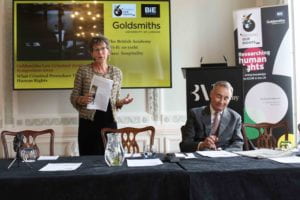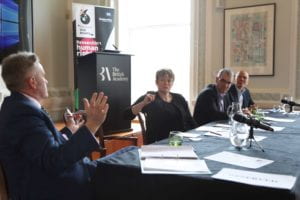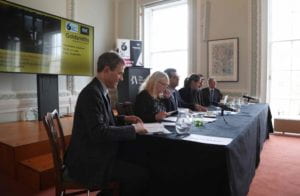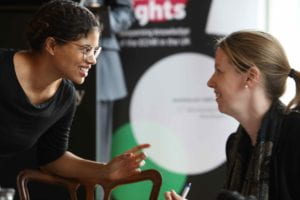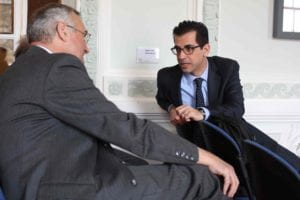
We’re delighted to welcome new arrivals to our teaching team:
Dr Alex Dymock returns to Goldsmiths – where she was once a Master’s student – from Royal Holloway, University of London, as a criminal law specialist with research interests in sexuality, sexual ‘deviance’ and the history of drugs.
Dr Virginie Barral joins us from the University of Hertfordshire, where she was Associate Professor and Associate Dean for Research. Virginie is an experienced lecturer in international law and human rights, with a passion for environmental issues including sustainable development and climate justice.
Dagmar Myslinska’s teaching career has taken her from New York and Tokyo to Goldsmiths, via the London School of Economics. Previous work as a lawyer based in US law firms, including in relation to challenging anti-same sex marriage legislation in the United States, speaks to her interest in social justice, and she brings an interdisciplinary approach to her teaching that includes a deep interest in migratory, racial and post-colonial issues.
Adam Wagner is a leading barrister at Doughty Street Chambers, and the founder and Chair of the pioneering and multi-award-winning RightsInfo charity. He will be joining Goldsmiths Law as a Visiting Professor, bringing with him a wealth of experience and exciting opportunities that our students will benefit from as they seek to learn the skills demanded by a career in law.
Dr Dymock, Dr Barral and Ms Myslinska will be leading in the delivery of Year 1 modules in the LLB Law programme, including Criminal Law: Theory and Practice, Contract Law and Public Law and the Human Rights Act. Prof Wagner will be making contributions to the Public Law and Human Rights Act module in Year 1, alongside leading on a number of initiatives relating to human rights law and public education.
Dr Alex Dymock
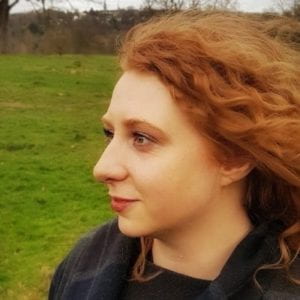 Dr Alex Dymock’s expertise lies principally in sexuality and gender studies with a focus on criminal law and sexual ‘deviance’. Her work draws frequently on her interdisciplinary background and combines methods from both the humanities and social sciences.
Dr Alex Dymock’s expertise lies principally in sexuality and gender studies with a focus on criminal law and sexual ‘deviance’. Her work draws frequently on her interdisciplinary background and combines methods from both the humanities and social sciences.
Prior to joining Goldsmiths, Alex was a Lecturer in Criminology and Law at Royal Holloway, University of London. She completed her PhD at the School of Law, University of Reading in 2015 and before this undertook an MA in Gender and Culture at Goldsmiths, and a BA in English Language and Literature at the University of Leeds. She converted her first degree to law at the University of Westminster.
Currently, Alex is leading a project funded by a Wellcome Trust Seed Award with Dr Leah Moyle and Dr Ben Mechen, entitled Pharmacosexuality: the past, present and future of sex on drugs. The project investigates the historical and contemporary interaction between the pharmaceuticalisation of sexuality and recreational drug use in sexual contexts, and uses both archival and qualitative methods. More information about the project is available here and on Twitter: @pharmacosex.
Research
Alex’s research interests centre on interdisciplinary sexuality and gender studies, particularly sexual ‘deviance’ and subcultures, pornography and the law, the history of sexuality, sexual medicine and psychiatry, and feminist and queer theory. She also has interests in the history of drugs, and the relationship between crime, criminal justice and visual culture.
Aside from Alex’s work on sex and drugs, other recent and current research projects include:
- A book developed from her PhD thesis, which examines the interaction between the history of discourses of perversion and criminal law in England and Wales (under contract with Routledge).
- The longstanding cultural, legal and social impacts of the Operation Spanner investigation.
- A series of publications on ‘revenge pornography’, with recent work appearing in a 2018 issue of Legal Studies.
Teaching
Alex is a fellow of the Higher Education Academy, and her teaching frequently employs critical and radical pedagogies. She also has an interest in experiential learning through assessment, and in 2018 was awarded a Royal Holloway College Teaching Excellence Prize with Commendation for her work in this area.
Public engagement
Alex’s research has been featured in a number of media outlets, such as BBC Radio 4 Woman’s Hour and the Guardian. She has given talks at venues such as the British Film Institute, Amnesty International, and the Centre for Crime and Justice Studies.
Dr Virginie Barral
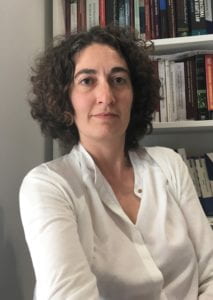 Dr Virginie Barral specialises in international law and holds a PhD from the European University Institute (Florence), and postgraduate degrees from University College London and Université Paris 2 Panthéon Assas.
Dr Virginie Barral specialises in international law and holds a PhD from the European University Institute (Florence), and postgraduate degrees from University College London and Université Paris 2 Panthéon Assas.
Before joining Goldsmiths she was an Associate Professor and Associate Dean Research at Hertfordshire Law School. She has previously taught at Université Paris 5. Prior to this she has worked for the French Commission for Sustainable Development and as a legal expert in the Paris office of Eversheds LLP.
She is a member of the European Society of International Law, the Société Française pour le droit international and the Society of Legal Scholars, and is an Associate Fellow of the Higher Education Academy.
Teaching
Virginie has extensive experience teaching international law, human rights, EU Law, public law and international environmental law. Her teaching combines theoretical grounding with innovative teaching skills and she is keen on placing current legal questions within their wider political and social contexts. Virginie has been an invited Professor at Chuo University (Tokyo) and a research scholar at Michigan Law School.
Research
Virginie has significant research expertise in international environmental law and is widely published in the field, with work in leading journals including a 2018 article at the International and Comparative Law Quarterly, where she explores how the right to water is consolidated in its procedural dimension, and a 2012 article in the European Journal on International Law, on sustainable development. Her 2015 monograph (Bruylant) explores the legal nature and implications of sustainable development in international law. Virginie is interested in issues of equity, sovereignty, natural resources, climate change and climate justice, and the relationship between culture and the environment. Her latest projects focus on environmental peacebuilding; climate justice, culture and human rights; and the role of community-based resource management.
Public engagement
Virginie regularly disseminates the results of her research at international conferences and colloquia. She did so most recently at the Sorbonne at a Conference opened by the COP21 president on the Global Pact for the Environment to be discussed by the UN General Assembly. In the last few years she has presented her work in e.g. Leiden, Tokyo, Kyoto, Geneva, the SLS, ESIL and the SFDI and in a symposium jointly organised by the French and Quebec Ministries for culture, on culture and sustainable development.
Dagmar Myslinska
 Dagmar Myslinska has undertaken a fully-funded PhD at the Department of Law at the London School of Economics, under the supervision of Professor Nicola Lacey and Dr Coretta Phillips, which critically examines Poles’ experience of mobility and their positioning within EU and UK equality frameworks. Dagmar graduated from Yale University with a BA (cum laude) in Psychology and Film Studies, with distinctions in both majors. She received her Juris Doctor degree from Columbia University School of Law, where she was the Head Notes Editor for the Columbia Journal of Transnational Law, and a recipient of the Harlan Fiske Stone Scholar award. She was admitted to the New York and New Jersey state bars in 2005.
Dagmar Myslinska has undertaken a fully-funded PhD at the Department of Law at the London School of Economics, under the supervision of Professor Nicola Lacey and Dr Coretta Phillips, which critically examines Poles’ experience of mobility and their positioning within EU and UK equality frameworks. Dagmar graduated from Yale University with a BA (cum laude) in Psychology and Film Studies, with distinctions in both majors. She received her Juris Doctor degree from Columbia University School of Law, where she was the Head Notes Editor for the Columbia Journal of Transnational Law, and a recipient of the Harlan Fiske Stone Scholar award. She was admitted to the New York and New Jersey state bars in 2005.
Teaching
Prior to joining Goldsmiths Law, Dagmar taught modules on commercial law, evidence law, and legal research and writing at the LSE. She has lectured at several undergraduate and postgraduate criminal justice and law programmes in the USA, including at Columbia Law School, State University of New York, and Fordham University, and has taught at a postgraduate law programme at Temple University in Tokyo. She has also supervised clinical students practicing immigration law, and overseen Juris Doctor and LLM students writing their dissertations.
In her teaching, Dagmar seeks to place law within its cultural, ethical, and socio-political contexts, often drawing on critical race theory and human rights perspectives. She also incorporates case studies from her own legal practice to provide experiential learning opportunities, while critically examining the foundations of laws. Her overarching teaching goals have been to guide students towards thinking creatively and critically, and to inspire them to pursue social justice.
Research
Dagmar’s research expertise falls at the intersection of law, migration, and race studies. She has published on how contemporary migrants have been approached under various jurisdictions’ equality frameworks, including in the UK, EU, USA, and Japan. Her current research project looks at the evolution of EU citizens’ rights during the unique post-referendum, pre-Brexit socio-legal and political regime. She is also working on publishing her doctoral monograph.
Her research is interdisciplinary and draws heavily on sociology, politics, geography, and postcolonial studies. Her academic publications have featured on leading US journals such as Tulane Law Review and PACE Law Review and have also been featured on several blogs, including the Immigration Prof Blog, the Legal Theory Blog, Race Racism and the Law, The Book Forum, and the American Immigrant Policy Portal. Dagmar had been invited to present her scholarship at numerous international conferences, including in Australia, Canada, France, Mexico, Korea, the UK, and the USA.
Dagmar has served as a peer reviewer for the McGill Law Journal, and an assistant editor for the LSE Law, Society and Economy Working Paper Series. She is currently a manuscript peer referee for the University of Bologna Law Review.
Public Engagement
Before entering academia, Dagmar practiced commercial litigation and pro bono immigration law. She worked at the law firms of Debevoise & Plimpton, Boies, Schiller & Flexner, and Davis Polk & Wardwell in New York. She was involved in several high-profile cases, including representing institutional and individual investors in Madoff feeder funds, same-sex couples in a challenge to Proposition 8 in California, and Maurice Greenberg in his disputes with AIG. She also clerked for two federal judges in the USA, including in the Southern District of New York. Dagmar has volunteered extensively for immigrant and refugee charities and NGOs, including Human Rights First in New York. Her numerous open-access reference articles on US asylum law have been published online by Nolo Press.
She has been interviewed and quoted by various media outlets on migration issues. She has also presented continuing-education seminars to US attorneys.
Adam Wagner
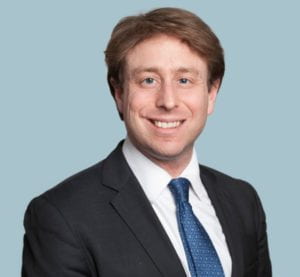 Goldsmiths Law is delighted to announce the appointment of Adam Wagner as a Visiting Professor in Law with a focus on human rights law and public legal education. This appointment reflects our commitment to offering a distinctive and eclectic educational and research provision – particularly in the areas of human rights and social justice – and a vibrant, professionally relevant, LLB programme. It follows up on the appointment of other world leading experts in this area and brings with it the opportunity to foster further outstanding career skills development opportunities for our students.
Goldsmiths Law is delighted to announce the appointment of Adam Wagner as a Visiting Professor in Law with a focus on human rights law and public legal education. This appointment reflects our commitment to offering a distinctive and eclectic educational and research provision – particularly in the areas of human rights and social justice – and a vibrant, professionally relevant, LLB programme. It follows up on the appointment of other world leading experts in this area and brings with it the opportunity to foster further outstanding career skills development opportunities for our students.
Adam is a leading barrister at Doughty Street Chambers. He has appeared in path-breaking cases such as the successful Supreme Court challenge to the law of joint enterprise murder, as well as acting in five major public inquiries, including the Al-Sweady Inquiry into allegations of mistreatment and unlawful killing by the British military in Iraq. His body of case work is truly diverse, representing claimants on a range of issues as varied as the over-spending of the Leave campaign during the 2016 Referendum campaign, to claims of an unlawful arrest and search of a child with autism, to the unjustified detention by the Home Office of a man with severe mental health issues. He has recently been appointed to the Equality and Human Rights Commission’s ‘A’ Panel of Counsel.
In addition to his busy legal practice, Adam is the founder and Chair of the pioneering and multi-award-winning RightsInfo charity, which has had great success in raising awareness of human rights in the UK, quickly becoming the go-to source on the internet for human rights awareness and engagement with topical human rights issues.
Adam is probably the best known lawyer in the UK for promoting human rights education through social and traditional media. He is well known on social media for his commentary on human rights law, with over 50,000 followers on Twitter and regular appearances on the TV and radio. He regularly writes on human rights issues in the national media. It is no surprise that in 2015, Adam won the Plain English Campaign’s Communicator award for his work on RightsInfo, the same year in which he was shortlisted for Human Rights Lawyer of the Year at the Liberty Awards.
Through lectures and other experiential learning activities, Adam will help to introduce students to the fundamental skills of the legal profession. There is also huge potential for talented Goldsmiths students to benefit from engagement with research opportunities, creative competitions, assisting with writing human rights news articles and overseeing Law Clinic activity.
Adam will carry out this role whilst continuing his legal practice at Doughty Street Chambers.
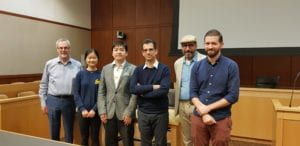
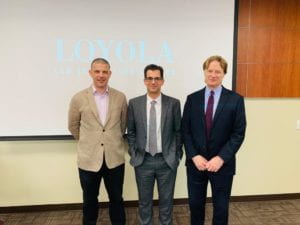
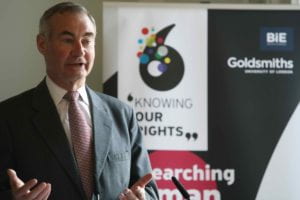 “It also behoves us to remember the difference between running a very long-established legal system such as ours in which an enormous amount can be taken as read, and, on the other hand, running a transnational court such as the Strasbourg Court where the judges come from an enormous variety of cultures, from a huge range of personal career experience, where there is no single common language, where the range of systems under consideration is enormous”.
“It also behoves us to remember the difference between running a very long-established legal system such as ours in which an enormous amount can be taken as read, and, on the other hand, running a transnational court such as the Strasbourg Court where the judges come from an enormous variety of cultures, from a huge range of personal career experience, where there is no single common language, where the range of systems under consideration is enormous”.